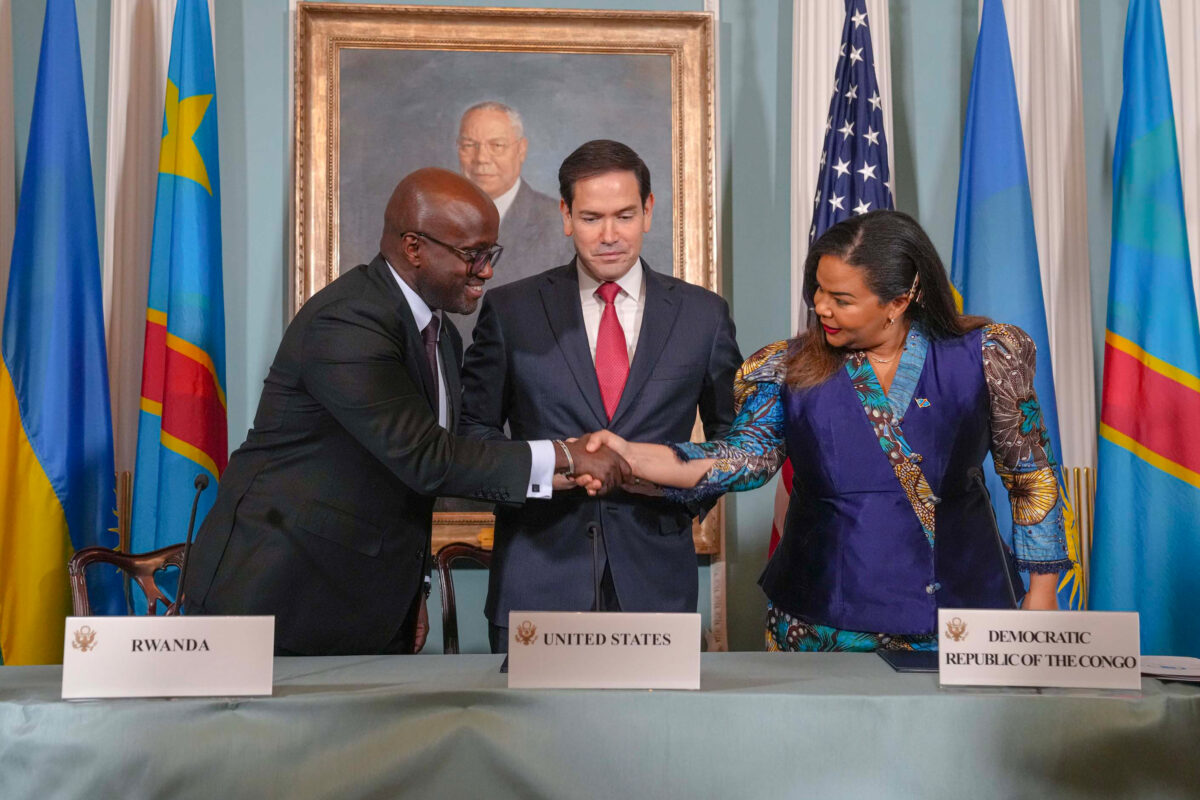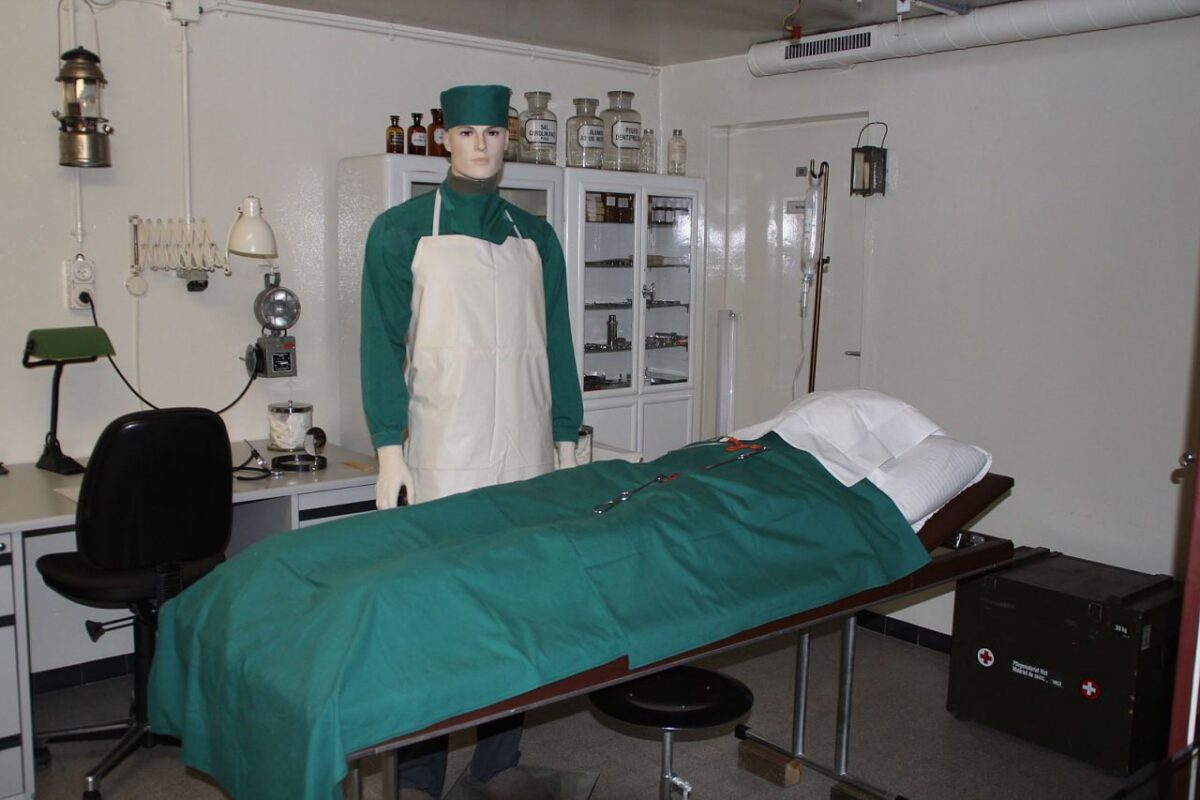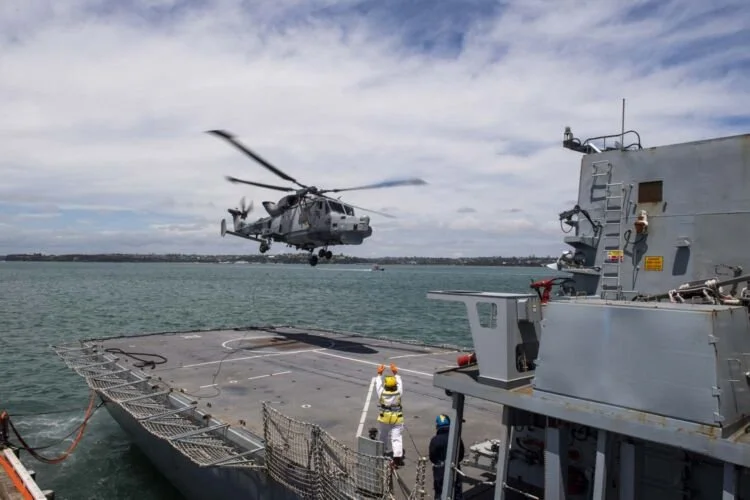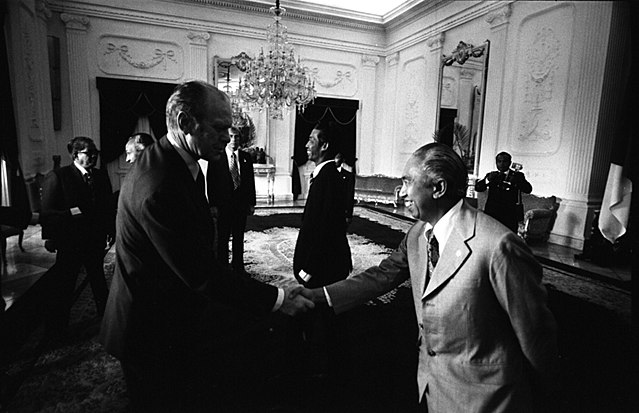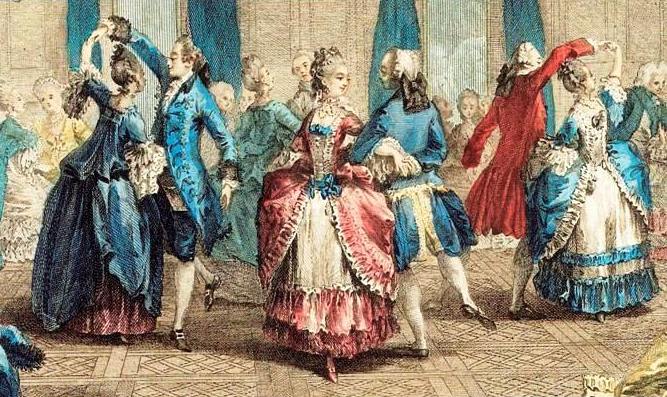The war in the Democratic Republic of the Congo (DRC) gained a new, imperialist turn on June 26th as a peace agreement with neighbouring Rwanda was signed, mediated by Qatar and the US. Yet, this won’t bring peace and prosperity to the region, but will rather further serve capitalist interests at the expense of the people of the DRC.
The conflict in the DRC has its roots in colonialism and imperialism, but also strikingly in the Rwandan genocide in 1994, when ethnic Hutu soldiers and extremists murdered about 800,000 members of the country’s ethnic Tutsi minority and moderate Hutu, as well as raped an estimated 250,000 women. In the aftermath, the new Rwandan Tutsi-led army then sought revenge on the DRC, where millions had fled to. Since then, according to different sources, the war on the mineral-rich eastern regions of the DRC has taken between 6 and 10 million lives, almost half of them children under age five. Rape has been used as a war tactic, villages and livelihoods have been destroyed, and millions have been displaced.
Since 2023, Rwanda-backed March 23 Movement (M23) paramilitary troops—once part of the DRC army—have been terrorising the country’s eastern Kivu region, with over 7,000 killed in fighting. The war escalated at the beginning of this year when M23 took over the region’s largest city of Goma. The Rwandan government has repeatedly denied its linkage to M23, but evidence from the UN tells another story.
Imperialism in central Africa
Rwandan President Paul Kagame is celebrated by many for the country’s economic growth, although poverty remains widespread outside the capital. At the same time, he is widely criticized as a ruthless dictator, having served as a de facto head of state for 30 years with the mission to establish “a home for the Tutsi population”. Kagame, a former Tutsi refugee in Uganda, initially led the Rwandan Patriotic Front (RPF), a militia founded by exiled Tutsis in Uganda in the 1980s, which fought the Rwandan Civil War and eventually ended the genocide. Yet, the international community, led by the US, failed to make the true genocide perpetrators accountable, many of whom were able to escape to the DRC and hide among the approximately 2 million—mostly unarmed—civilian Hutu refugees. Hence, with the already dodgy record of the RPF due to human rights violations, Kagame started to wage massacres against these refugees over the border. In 1996, with the support of the US, and UN leaders looking the other way, Rwandan and Ugandan armies acted with impunity and organized a full-scale invasion of the DRC’s eastern regions. This is known as the First Congo War.
According to the documentary Crisis in the Congo: Uncovering the Truth by Friends of the Congo, the US government, as well as the international community, knew very well about the atrocities being committed, but only stayed silent. Thanks to its location in the central African Great Lakes region, along with its proximity to the Horn of Africa, Rwanda is surrounded by the DRC minerals and West-Sudanese oil, making it an important geopolitical ally for the US. As stated in the documentary, the whole US economy and its military funding are, indeed, based on the raw minerals from central Africa. Similar to German Chancellor Friedrich Merz’s observation that Israel is doing the “dirty work for us” in Iran, Howard French from The New York Times explains in Crisis in the Congo the US strategy:
“Why are Uganda and Rwanda important to the US military? Precisely because we can have them do in Africa that which we don’t wish to do ourselves. We can have their soldiers die if need be, we can have them to deploy to places if need be. And so having proxies, having allies, and having clients who are willing to do your bidding becomes very important.”
Moreover, the EU is among Rwanda’s largest supporters, most recently as a part of the “Global Gateway” project for minerals for the “green transformation” and to counter China’s growing influence in Africa. Yet, a diplomatic crisis has arisen since an investigation by Global Witness has revealed Rwanda’s decades-long involvement in “conflict minerals” from the DRC. Evidently, Rwanda has been trading for instance white coltan with the EU—a raw material used in various electronics, but which does not occur in large amounts on Rwanda’s own soil. Further, in 2024, the DRC filed criminal charges against Apple in France and Belgium for the use of conflict minerals in their supply chains. This now poses a reputational risk for the European Commission, and Belgium has been pushing for sanctions against Rwanda. In response, Rwanda cut diplomatic ties with Belgium. The issues have been predictable: while the EU as well as Rwanda have praised “sustainable and responsible production”, the DRC’s sole control organ for the mineral supply chain, the International Tin Supply Chain Initiative (ITSC), has shown evident gaps, with some members involved in laundering conflict minerals, child labour, trafficking, and smuggling in the DRC.
However, the most important political and economic partners of Rwanda remain the US and the UK, and estimates state that diplomacy with Belgium will soon be restored out of pragmatism. With its powerful allies in the Global North and the rhetoric of defending “national security” and protection of the Tutsi minority in the DRC, Rwanda has developed into an important power in Africa —“a poster child of neoliberalism”—sending out the EU and the US paid troops to Central African Republic or even until the coast of Mozambique, where large gas reserves are located. As Mwambari stated: “This classic story is palatable to the Western world, in which the concept of genocide and resilience have a special place in the media narrative, especially in the United States, with its unique relationship with Israel (2021, p. 611–628).”
Congo’s bitter past and the present
The DRC, on the other hand, has been a colonial, imperial playground, and the people have been displaced, abused, kidnapped, raped, enslaved, mutilated and murdered since the Berlin Congo Conference of 1884–-1885, during which Congo was handed out to King Leopold II of Belgium. Indeed, the fast industrialization in Europe had created a new demand for raw materials found on African soil, and so the “scramble for Africa” began. Under the humanitarian narrative of bringing “civilization” and security to the region, King Leopold II and his administrators established the king’s own plantation for ivory and rubber for the newly invented vehicles. Between 1885 and 1908, 10–15 million Congolese were killed in this world’s only private colony. The Belgian government eventually took over, yet the structures of forced labour, apartheid and kidnapping of “mixed-race” children by the settler colonial regime continued.
Further, as the DRC serves as the warehouse of vast reserves of crucial minerals—gold, copper, coltan (70% of the world’s reserves), and uranium—imperial interests continue to hold their grip. However, after the official colonial rule, in 1960 the people of the DRC saw a brief light of true liberation—but for only three months. The film Lumumba by Raoul Peck documents the life of the revolutionary pan-Africanist, socialist Patrice Lumumba, depicting his path to becoming a celebrated, freely elected prime minister in June 1960. As shown in the film, Lumumba was feared and hated by the white settlers and threatened imperialist interests. The US, together with Belgium and the UK, reacted with a coup and assassination of Lumumba by the CIA in 1961, subsequently placing Joseph Mobutu in power for the next 30 years—“to save Congo from communism”. With the help of his “Western” allies, Mobutu would become one of Africa’s most notorious and cruel dictators. He plundered the country’s resources instead of investing in health care, education or infrastructure for the people, and accumulated an estimated 4 billion US dollars in his Swiss bank accounts.
As the Cold War ended and the record of immense human rights violations committed by Mobutu became somewhat embarrassing to the US, the West required a new, strong accessory in the region. It seemed they’d hit the jackpot with a former ally of Lumumba’s and opposition leader of Mobutu, Laurent-Désiré Kabila, who seized power with Rwanda’s help in the First Congo War in 1997. However, Kabila soon started to pose nationalist demands, and so the imperialist eyes turned to the country’s eastern neighbour, which was struggling with the aftermath of the genocide and wanted to continue retaliatory actions towards the ethnic Hutu in the DRC.
Throughout the decades, many attempts have been made for peace and security. However, although UN “peacekeeping” missions under various names have been on the ground since 1999, they have been struggling with credibility. UN peacekeepers have been accused of standing by as M23 took over Goma in 2012, not addressing the army’s human rights violations, chaotic and greedy leadership, or simply being useless. What is more, the United Nations Organization Mission in the Democratic Republic of the Congo (MONUC), one of the former missions, concentrated on fighting only rebel groups opposing Rwandan or Ugandan interests. After several protests, the latest United Nations Organization Stabilization Mission in the DR Congo (MONUSCO) was banned by the DRC in 2024 for not being able to bring peace.
Old wine in a new bottle
Yet now, the DRC’s Minister of Foreign Affairs Thérèse Kayikwamba Wagner and her Rwandan counterpart, Olivier Nduhungirehe, have signed a peace agreement at Marco Rubio’s office in Washington, with the US calling this a “historic turning point”. The peace deal aims at the “neutralization” of the Democratic Forces for the Liberation of Rwanda (FDLR) militias and other groups. The FDLR was established by the ethnic Hutus after the Rwandan genocide and has been accused of immense atrocities like the murder of civilians and the use of child soldiers. However, the deal does not mention the role of Rwanda’s forces, which have also been suspected of participating in the conflict and are present in the DRC, violating the country’s territorial sovereignty. Further, M23 calls its mission the protection of the Tutsi community in the DRC against discrimination by the government and, hence, is supported by Rwanda. The deal with M23 is being negotiated separately with Qatar during the first week of August. Interestingly, Qatar is now investing heavily in the Kigali airport as well as the national RwandAir, as Qatar plans to establish its first cargo hub abroad.
Kambale Musavuli from the Center for Research on the Congo says many are questioning the deal with the US, which has not been transparent and includes giving up rights to minerals., and only then could the US “be engaged constructively” in the peace stability. Indeed, there has been an increasing interest by US companies in investing in crucial minerals in the DRC for new technology, such as electric cars, nuclear plants or weaponry, especially now since Chinese companies are gaining more and more influence in Africa. Yet, the miners in Katanga Province have already put out a statement against the agreement, and some MPs have questioned why this was not first discussed in the country’s parliament or the senate. Moreover, it has been strongly emphasized that DRC cannot lose control of their own minerals—by Lumumba and still today. Even the former president of France, Nicolas Sarkozy, previously offered a similar deal: minerals in exchange for peace attempts.
Moreover, the new “peace deal” does not address justice and accountability for the millions of deaths, displaced people or the severe atrocities such as rape as a war tactic, killings or torture—still taking place in M23-controlled areas. What the deal does include is US military training to “secure peace”. Yet, as history has shown us, armies are seldom there to protect people, but rather to secure the capital and easy access to resources. Musavuli draws a parallel to history by stating Trump is now creating false narratives of Congolese people being killed by machetes and, hence, needing to be saved—by the US: “At least for him, being the new King Leopold, he’s telling us what he got from DR Congo. […] The US has literally shown to the world that for them to have supremacy, they will do everything in their power to have control over Congo.”
Robberies, shootings, extortion, and rapes have been carried out by over 120 different groups pursuing different business or political interests—in collaboration with organized crime by multinational corporations, and even with the army itself, which sells weapons to whoever can pay. Musavuli goes further, stating the army is, in fact, the source of these groups and the perpetrators are “coming in and out of the military”, acting with impunity, contributing to a never-ending cycle of peace negotiations. Hence, none of the peace agreements have worked so far. What is more, the whole political structure of the country has been marked by predation, impunity, patronage, and a longstanding lack of legitimacy for decades—or even centuries.
In summary, the new imperialist deal is everything but justice and peace for the people of the DRC. But, the Congolese are calling for justice, and it is evident that this can only come from below, from the liberated people in control of their own resources instead of by creating new neocolonial exploitation structures with foreign military forces. According to Musavuli, Lumumba remains an aspiration; resistance is there, and people do keep fighting for their rights and the liberation of the DRC, like the fierce youth of Goma who protected the city against the M23 troops for 2–3 days. Musavuli quotes Lumumba: “Congolese are not alone but […] every liberated people everywhere around the world have always been found on the side of the Congolese people and because of that we are sure that people around the world will join us as we are fighting to transform the African continent”.
